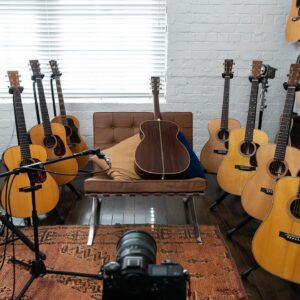Some people buy vintage gear as an investment, which can certainly be true if you choose the right instruments. However, it is important to keep in mind that Guitar Center does not typically offer near full retail value for used gear.
Changing the instrument’s appearance or making other personal modifications can significantly decrease its value. Generally, you should try to treat your guitar with care and avoid making major changes to it.
Guitars
 Guitars are some of the easiest pieces of gear to sell or Studio1Vintage guitar trade in. They are in demand at all times, and so the resale value is high. They also tend to be more easy to sell than other items such as DJ equipment and PA systems. If you have a guitar that you want to get rid of, there are a few things you should consider before you try to sell it.
Guitars are some of the easiest pieces of gear to sell or Studio1Vintage guitar trade in. They are in demand at all times, and so the resale value is high. They also tend to be more easy to sell than other items such as DJ equipment and PA systems. If you have a guitar that you want to get rid of, there are a few things you should consider before you try to sell it.
First, you should clean the instrument before trying to sell it. This will help it look cleaner and will increase the price that you will be able to get for it. It is also important to make sure that the neck of the guitar is straight and not bowed. This will help it play better and allow you to tune it correctly.
Another thing to keep in mind is that Guitar Center is primarily interested in buying gear that has good resale value. This means that they will only purchase an instrument, amplifier or pedal that is in a decent condition. They may be able to accept some minor cosmetic damage, but only if it will not affect the functionality of the gear.
You can call the store to see if they are interested in your gear, but they will only provide you with an estimate if you bring it in. This means that you will have to take the time to travel to the store and bring your guitars, amps or other gear with you.
Amps
Like a classic car, Studio1Vintage guitar trade in vintage guitar amps are prone to a lot of wear and tear over the years. If you want a really cool sounding amp with that old school vibe, you’ll need to get it checked and repaired if needed by an expert. Finding a good amp tech who can work on tubes isn’t always easy, but there are plenty of them around if you ask around and make the effort to find one.
When it comes to tube amplifiers, the Roland JC-120 is the cream of the crop. This little powerhouse has a big reputation and has been used on endless amounts of era-defining records since its launch in 1975. It has a stereo chorus and masses of headroom – enough to satisfy even the most demanding guitar players.
If you want to go a step further, then there’s the Marshall Studio Vintage SV20H. This amp tries to distill the classic Marshall Plexi into a smaller package that’s a bit more practical for gigging and recording. It has that same crunch that made the hearts of Hendrix, Clapton, and Page flutter. You can even knock the wattage down from 20W to 7W if you’re playing in a smaller venue or recording at home.
The only downside to buying a vintage amp is that it may need a full service and/or repair before you can use it again. Depending on where it’s been and how often, it could need everything from a new speaker to a full rebuild to be in the best possible condition for its age. If you’re planning on using it a lot, then this will add to the overall cost of the amp.
If you’re looking to get a rough idea of how much your amp is worth, there are a number of websites that offer valuations for all sorts of gear. Reverb is one of the biggest, and it uses a huge database to compare what people are selling their gear for. They’ll also give you a history of prices on that particular item over time. You can get values for electric guitars, acoustic guitars, pedals, and almost any other kind of music gear.
Effects
While anyone who plays guitar knows how personal the instrument can become, some people take this to an extreme by adding personalised touches and making alterations to their guitars. This can be a great way to make the guitar feel like your own, but it may also lead to the instrument losing value over time. This is because a guitar that has been customised may not be as desirable to buyers, especially if it involves changing different parts of the instrument.
Many collectors buy vintage Studio1Vintage guitar trade in guitars with the intention of flipping them for a profit. However, it is not always possible to sell them quickly enough, which means that the guitars will likely end up sitting on a shelf for some time before they can be sold. This can be a big problem if the guitar is not used often, as it will need to be treated with extra care and maintenance in order to keep it in good condition.